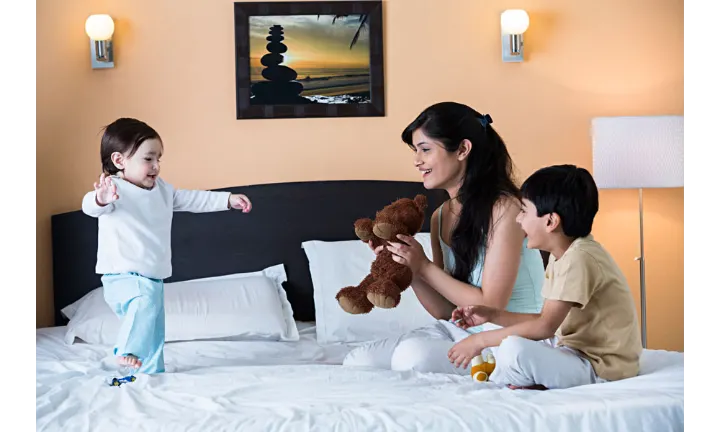When Do Babies Start Talking?
Hearing your little one speak is one of those thrilling milestones that you eagerly wait for. Apart from your baby's first words that sound adorable, it's a huge accomplishment for you and your baby when she can start expressing her wants and needs verbally. Learn more about at what age do babies say their first word and other language development milestones below. Keep reading to understand when do kids start talking and what you can do to help encourage your baby to start talking.
How Do Babies Communicate?
Whether it's crying when hungry, cooing when happy, turning their faces away when they dislike a food or toy, kids are quite skilled in getting across their needs way before they start talking. These simple forms of communications through early sounds and gestures lay the foundation for developing excellent language skills later on. Similar to adults learning a foreign language, babies usually understand more than they can speak. Understanding what your child is speaking is easy; you simply have to listen to her. Try observing her reactions to the things you say.
When Do Babies Say Their First Words?
Language milestones like first words and other speech-related skills occur at varying times for different children. So, worry not; your little one will progress at her own pace. Generally, a baby might say her first few words around the time she's about to turn one. Your baby's vocabulary may progress slowly in the beginning during the second year and pick up toward the end. Usually, many (but not all) babies may be able to say dozens of words and make a few sentences by the end of this second year. Learn more about when do babies say their first words.
When Will by Baby Learn Her Name?
Usually, around the age of four or eight months old, babies begin recognising the sound of their names. You can notice it for your child by gently calling out her name - she may turn her face to you. However, ensure that she's really reacting to the name, and not just to the tone or the sound of your voice.
How Do Babies Learn to Say Their First Words?
Even before your baby begins to talk (talking is what experts refer to as expressive language), she understands more than you think (understanding is known as receptive language). She's also communicating effectively in a number of ways:
She cries to let you know she’s hungry
She coos when she’s happy
She points at a toy she wants
She turns her face at a food she doesn’t like.
This type of gestural and vocal communication lays the groundwork for the development of speech and language. Babies learn to talk by listening to you and others talking. Babies prefer listening to the human voice over other sounds, and your baby will especially love the sound of your voice, because it’s the most comforting for her. Generally, babies prefer high-pitched voices. This is why you might find yourself talking to your baby in a higher pitch than you would when speaking to adults. This higher pitch, in addition to exaggerated pronunciation and playful facial expressions you probably use, captures your baby’s attention, and also contributes to helping develop her speech and language skills.
What Are a Baby’s Talking Milestones?
Below you will find some of the important language development milestones grouped by broad age ranges. Keep in mind that these aren't set in stone. You may see your baby or toddler reach certain speech and language milestones earlier or later than what's described here. If you're ever uncertain about whether your little one is on track or have any questions about your baby's development, reach out to your baby's doctor. Learn more about baby talking timeline and how to encourage babies to speak their first words.
Language Development Milestones: 1- to 3-Month-Old Babies
When your baby is at least a month old, she may be able to recognise your voice, whether or not you're in the same room. Smiling and gurgling at you when she sees your face indicates that she realises these facial expressions and sounds are a way to engage with you. Around two months of age, your baby may start cooing and producing sounds like “ah-ah-ah” or “ooh-ooh-ooh.” Feel free to imitate her by repeating these sounds while also adding some simple words, as this engages your little one in a two-way “conversation.”
Language Development Milestones: 4- to 7-Month-Old Babies
At this point your baby may be babbling often in what is sometimes called “baby talk”. Between about four and seven months of age, she may make sounds like “muh-muh” or “bah-bah.” She'll also be attuned to your voice as you go about your daily routine and will be learning from your voice when you're going to feed her, change her or take her for a stroller ride. It may take a year or more for you to be able to interpret your baby's babbling, but keep in mind that she can understand much of what you say to her well before she says her first words.
Language Development Milestones: 8- to 12-Month-Old Babies
Your baby's coos, gurgles, and screeches may start to be replaced by syllables like ba, da, ga, and ma. He may say something that sounds like “mama” or “dada” as he practices these syllables and will soon realise these words have meaning when she sees your obvious excitement. By this point your baby will likely understand a lot more than you think, even though she might not be able to communicate in more than a few, simple words. It could be around this age when your child begins to use some recognisable words. Some babies have a vocabulary of about two or three words by the time they turn one-year-old. Keep in mind, though, that what's more likely for most children of this age is talking in a sort of gibberish that's starting to sound like comprehensible language.
Language Development Milestones: 13- to 24-Month-Olds
At this point your toddler will have a very good understanding of language. She’ll know, for example, what "nap" means, which is why you might have to spell this word out (or any other word you don't want him to understand) when you're talking to someone else in his hearing. During the course of this year, your child will become more responsive to directions and requests from you and may even put together some short two- or three-word sentences. You no longer need to speak in a high-pitched baby voice. Go ahead and use a normal adult voice and continue to speak to your toddler using simple words and short phrases or sentences. Remember, however, that all children develop language skills at their own pace. This means some children won't talk that much in their second year and may hit these milestones a little bit later. As your child's speech is developing, she may change portions of words by substituting different letters or sounds. You may be the only one who understands her way of saying certain words. For example, she may say “wa-wa” for water. When this happens, you can reinforce your child's made-up word wa-wa with the correctly pronounced word water to help build her language skills.
How Do You Help Your Baby Start to Talk?
Ready to encourage your little one’s speech and language development? Here are some tips you can follow to help him start talking:
Get Chatty:
Simply talking to your baby teaches him new vocabulary and encourages his first words. Talk aloud to your little one as you go about your daily tasks, even when what you have to say seems silly (for example, “Daddy’s folding the blue socks right now!”). Provide narration when you’re in a new environment to introduce him to new words (for example, “Look at those pretty flowers in the park!”). You can also do things like name his body parts as you go about changing his diaper, or name the items you’re dressing him in.
Talk Back:
Follow your child’s interests and let him be your guide when deciding what to talk about. For example, if your child is staring at a dog and babbling, make this the topic of conversation and repeat the word “dog” while pointing at the pup.
Focus on Routines and Repetition:
Daily activities such as bath time, mealtime, and diaper changing time are ideal opportunities to have the same conversations with your baby each day. During these times, he will begin to pick up on key words and phrases and associate them with the activity.
Model Speech for Your Baby:
To help your baby build language skills, speak in slow, short sentences and give him a chance to try and repeat what you're saying when he's ready. Help him recognise objects and words through play; for example, “Here’s your ball. Let’s hide the ball.” If your child is pointing at a ball, you can ask, “Do you want your ball?” Speaking in full sentences not only helps you confirm and understand what your child is trying to say, it also helps him understand sentence structure.
When to See a Doctor?
Although some children develop language skills and a vocabulary at a constant rate, others take some time to become talkative. A quiet toddler aging between one and two years old (of speaking age) may know enough words as the one who is talkative but chooses not to use them. Chances are that she may be shyer and more reserved. Also, keep in mind that girls develop speech and language skills a little earlier than boys. However, avoid waiting or ignoring if you feel your child is behind in her language development. It is best to raise any concerns you may have with your baby’s doctor. Remember, speech and language development delays are very treatable. The earlier you seek help for your baby or toddler, the sooner your doctor can help. Your doctor may recommend a hearing specialist or a speech-language pathologist for your baby.
The Bottom Line
We understand that you may be eagerly awaiting your baby’s first words but try and be patient. Your little one will start talking when he’s ready. Try talking to him to teach and encourage him. Eventually you’ll be surprised to hear his first words. Soon, your baby will be talking and asking tons of questions as he explores the world in a whole new way.
How We Wrote This Article
The information in this article is based on the expert advice found in trusted medical and government sources. You can find a full list of sources used for this article below. The content on this page should not replace professional medical advice. Always consult medical professionals for full diagnosis and treatment.


